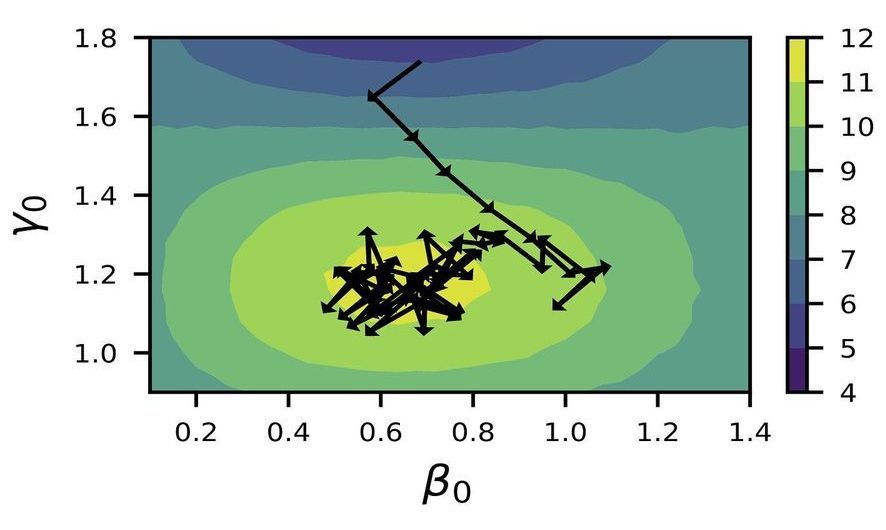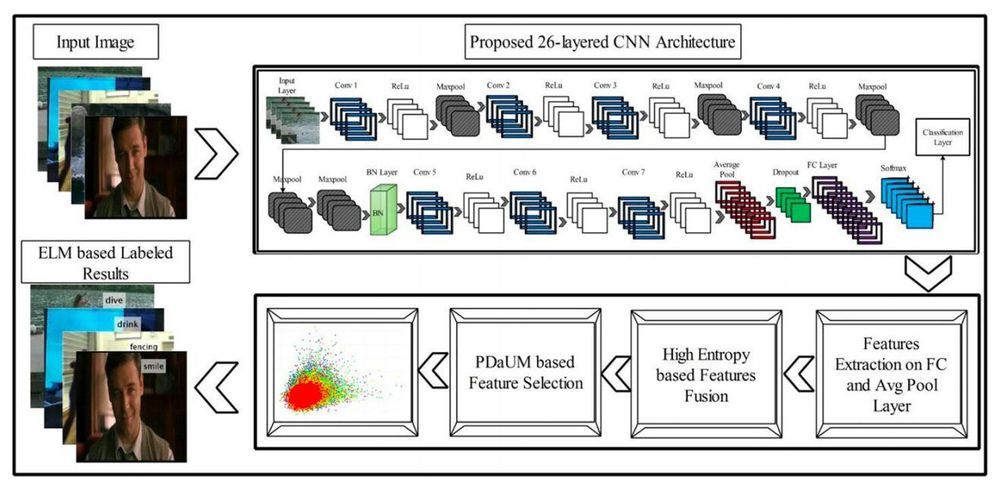No puncture, no pressure. GM could offer Michelin’s airless tire soon.
Get the latest international news and world events from around the world.
Rotary cell phone
A space engineer made a working rotary cell phone.
Tiny battery for micro robots
This tiny battery could change the game for micro robots.
Superluminal Motion-Assisted 4-Dimensional Light-in-Flight Imaging
Abstract: Advances in high speed imaging techniques have opened new possibilities for capturing ultrafast phenomena such as light propagation in air or through media. Capturing light-in-flight in 3-dimensional xyt-space has been reported based on various types of imaging systems, whereas reconstruction of light-in-flight information in the fourth dimension z has been a challenge. We demonstrate the first 4-dimensional light-in-flight imaging based on the observation of a superluminal motion captured by a new time-gated megapixel single-photon avalanche diode camera. A high resolution light-in-flight video is generated with no laser scanning, camera translation, interpolation, nor dark noise subtraction. A machine learning technique is applied to analyze the measured spatio-temporal data set. A theoretical formula is introduced to perform least-square regression, and extra-dimensional information is recovered without prior knowledge. The algorithm relies on the mathematical formulation equivalent to the superluminal motion in astrophysics, which is scaled by a factor of a quadrillionth. The reconstructed light-in-flight trajectory shows a good agreement with the actual geometry of the light path. Our approach could potentially provide novel functionalities to high speed imaging applications such as non-line-of-sight imaging and time-resolved optical tomography.

How to make AI trustworthy
One of the biggest impediments to adoption of new technologies is trust in AI.
Now, a new tool developed by USC Viterbi Engineering researchers generates automatic indicators if data and predictions generated by AI algorithms are trustworthy. Their research paper, “There Is Hope After All: Quantifying Opinion and Trustworthiness in Neural Networks” by Mingxi Cheng, Shahin Nazarian and Paul Bogdan of the USC Cyber Physical Systems Group, was featured in Frontiers in Artificial Intelligence.
Neural networks are a type of artificial intelligence that are modeled after the brain and generate predictions. But can the predictions these neural networks generate be trusted? One of the key barriers to adoption of self-driving cars is that the vehicles need to act as independent decision-makers on auto-pilot and quickly decipher and recognize objects on the road—whether an object is a speed bump, an inanimate object, a pet or a child—and make decisions on how to act if another vehicle is swerving towards it.

Quantum simulation of quantum crystals
The quantum properties underlying crystal formation can be replicated and investigated with the help of ultracold atoms. A team led by Dr. Axel U. J. Lode from the University of Freiburg’s Institute of Physics has now described in the journal Physical Review Letters how the use of dipolar atoms enables even the realization and precise measurement of structures that have not yet been observed in any material. The theoretical study was a collaboration involving scientists from the University of Freiburg, the University of Vienna and the Technical University of Vienna in Austria, and the Indian Institute of Technology in Kanpur, India.
Crystals are ubiquitous in nature. They are formed by many different materials—from mineral salts to heavy metals like bismuth. Their structures emerge because a particular regular ordering of atoms or molecules is favorable, because it requires the smallest amount of energy. A cube with one constituent on each of its eight corners, for instance, is a crystal structure that is very common in nature. A crystal’s structure determines many of its physical properties, such as how well it conducts a current or heat or how it cracks and behaves when it is illuminated by light. But what determines these crystal structures? They emerge as a consequence of the quantum properties of and the interactions between their constituents, which, however, are often scientifically hard to understand and also hard measure.
To nevertheless get to the bottom of the quantum properties of the formation of crystal structures, scientists can simulate the process using Bose-Einstein condensates—trapped ultracold atoms cooled down to temperatures close to absolute zero or minus 273.15 degrees Celsius. The atoms in these highly artificial and highly fragile systems are extremely well under control.
DARPA Launches Project CHARIOT in Bid to Shield Big Tech Profits
DARPA announces a new type of cryptography to protect the Big Tech firm profits from the dawn of quantum computers and allow backdoor access into 3 trillion internet-connected devices.
by Raul Diego
The U.S. Military-Industrial complex is sprinting on a chariot to shore up the encryption space before the next era of computation upends the entire digital edifice built on semiconductors and transistors. But, the core of the effort is protecting markets for Big Tech and all of its tentacles, which stand to lose years or even decades of profits should the new tech be rolled out too quickly.

Researchers have a bold proposal to tackle one of the biggest barriers to more renewable energy
The phrase “too much of a good thing” may sound like a contradiction, but it encapsulates one of the key hurdles preventing the expansion of renewable energy generation. Too much of a service or commodity makes it harder for companies to sell them, so they curtail production.
Usually that works out fine: The market reaches equilibrium and economists are happy. But external factors are bottlenecking renewable electricity despite the widespread desire to increase its capacity.
UC Santa Barbara’s Sangwon Suh is all too familiar with this issue. The professor of industrial ecology has focused on it and related challenges for at least the past two years at the Bren School of Environmental Science & Management. “Curtailment is the biggest problem of renewable energy we are facing,” said Suh, who noted it will only escalate as renewable energy capacity increases.

Scientists use reinforcement learning to train quantum algorithm
Recent advancements in quantum computing have driven the scientific community’s quest to solve a certain class of complex problems for which quantum computers would be better suited than traditional supercomputers. To improve the efficiency with which quantum computers can solve these problems, scientists are investigating the use of artificial intelligence approaches.
In a new study, scientists at the U.S. Department of Energy’s (DOE) Argonne National Laboratory have developed a new algorithm based on reinforcement learning to find the optimal parameters for the Quantum Approximate Optimization Algorithm (QAOA), which allows a quantum computer to solve certain combinatorial problems such as those that arise in materials design, chemistry and wireless communications.
“Combinatorial optimization problems are those for which the solution space gets exponentially larger as you expand the number of decision variables,” said Argonne computer scientist Prasanna Balaprakash. “In one traditional example, you can find the shortest route for a salesman who needs to visit a few cities once by enumerating all possible routes, but given a couple thousand cities, the number of possible routes far exceeds the number of stars in the universe; even the fastest supercomputers cannot find the shortest route in a reasonable time.”

A 26-layer convolutional neural network for human action recognition
Deep learning algorithms, such as convolutional neural networks (CNNs), have achieved remarkable results on a variety of tasks, including those that involve recognizing specific people or objects in images. A task that computer scientists have often tried to tackle using deep learning is vision-based human action recognition (HAR), which specifically entails recognizing the actions of humans who have been captured in images or videos.
Researchers at HITEC University and Foundation University Islamabad in Pakistan, Sejong University and Chung-Ang University in South Korea, University of Leicester in the UK, and Prince Sultan University in Saudi Arabia have recently developed a new CNN for recognizing human actions in videos. This CNN, presented in a paper published in Springer Link’s Multimedia Tools and Applications journal, was trained to differentiate between several different human actions, including boxing, clapping, waving, jogging, running and walking.
“We designed a new 26-layered convolutional neural network (CNN) architecture for accurate complex action recognition,” the researchers wrote in their paper. “The features are extracted from the global average pooling layer and fully connected (FC) layer and fused by a proposed high entropy-based approach.”